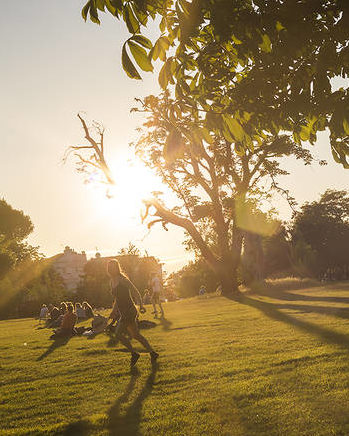You have no items in your cart. Want to get some nice things?
Go shopping And then you’re back. Three days of being exhausted, sleeping, working, sleeping, then yesterday a run on what they said was the hottest day of the year – 22 degrees in London – and all day you’d been at your desk, Femi in the next room writing at the dinner table. You ran together. It was like being back at your Tuesday evening running club: Clissold Park, Finsbury Park, Highbury Fields, the way you’d run through the back streets to get from one green space to the next, the lungs of the city, the whole world opening up. Like an oyster. It was your oyster. Running in a group, silently together, each at your own pace.
And then you’re back. Three days of being exhausted, sleeping, working, sleeping, then yesterday a run on what they said was the hottest day of the year – 22 degrees in London – and all day you’d been at your desk, Femi in the next room writing at the dinner table. You ran together. It was like being back at your Tuesday evening running club: Clissold Park, Finsbury Park, Highbury Fields, the way you’d run through the back streets to get from one green space to the next, the lungs of the city, the whole world opening up. Like an oyster. It was your oyster. Running in a group, silently together, each at your own pace.
At this morning’s Bikram session there was something of that, all at the same time, some pausing, sitting out a posture, binding less, toes not quite wrapping around the calf in Eagle Pose. Following instructions. Eagle Pose comes after Awkward Pose and before Standing Head to Knee, Dandayaman-Janushirasana. The satisfying swing of the right arm under the left, the coming together of the palms, not in prayer yet, but fingers interlocked below the nose, sitting down, then lifting right leg over left. The binding of arms and legs, pressing thighs together, balancing on one leg. She says it’s good for the reproductive system, that it opens up the skeletal system. Your mind is finally in the room. The frustration of the Pranayama breathing at the start of the session is behind you, the joint pain in Half Moon Pose is gone, the awkwardness of Awkward Pose – gone, you’re meant to be here. Just minutes ago you’d wanted to walk out and now you are here in stillness – learn to practice stillness, she says – preparing for Eagle Pose, landing.
Just when you’re thinking you’re not really enjoying the way she teaches and she keeps forgetting people’s names, Joe become John and Mark is now Scott. Well done, Scott, even though his name is not Scott. You are closest to her, your mat just one mat away from her box, so you consider saying: you’re getting their names wrong. But you’re not sure it would go down well; she’s critical: “I’m not picking on you,” she says to someone called Maria, whose name might not be Maria, “I’m teaching you.” You figure that if she’s thinking in terms of “picking on” she might not like it when a student who’s not so good at what he’s doing tells her she’s getting it wrong.
You stick to your postures.
Camel Pose is not a pose you look forward to. You don’t like it because you can’t do it. Bend back, she says, bend back and more back until you see the back wall. And then hold onto the backs of your foot. It’s all about back and your back is your problem. Then on the second set you can almost see the back wall and that’s good enough so you reach back with your right hand and there is the back of your foot and then there is the back of your left foot and you’re arching your back and lifting your chest and you are in it. You come out of the pose stunned, bow forward, exhausted and elated and you grunt and say fuck and she says what’s happened are you okay and you say the first time, my first time, and you lie on your back and laugh, briefly and deeply, almost hysterically.
She says: If you’re happy, I’m happy.
You mouth, happy, still smiling.
Then it is time for a Bikram sit-up.
Later she will say: If you have to ask yourself, should I go to yoga, then you’re halfway to losing. Would you ask yourself, should I brush my teeth? That’s what yoga must be, a ritual, a habit, a thing you do without deciding. Tomorrow you will be here again.
At a dinner party in Morden last week, you got talking to Femi’s sister and discovered you both liked yoga, that you watch the same YouTube videos of Adriene’s 30 Days of Yoga.
“What’s your favourite pose?” she says.
You’ve never thought about having a favourite posture, maybe because you’re still new to yoga. Favourite colours are easier, but are they really your favourites or have you just got used to naming them when the question comes up? Blue and green. But you like orange, and red, and you like pink. So you say: the balancing postures.
You really do like them, Tree and Bow. You also like Happy Baby. You were standing in the garden, Femi’s sister and you. She’d flown in from Zurich to exhibit her work at a gallery in South London. You agree that it’s nice to find others who are into yoga, that it’s an endurance sport, a sport where you progress, a practice that improves over time. You can measure it. At some point you can manage certain postures, bind better, increase flexibility. You work through your issues.
Your issue at the moment is breathing. You hold your breath too much. At the gym, or when you’re boxing, you notice this. Breathe, your coach keeps telling you. Breathe more. Your least favourite posture is the first one: Standing Deep Breathing Pose. Pranayama. You don’t like it because you can’t do it yet. Your neck goes all funny when you lean your head backwards, the top of you spine, like it could crack.
Two sets of ten breaths, in through the nose, out through the mouth, the only time you’ll do this in the whole ninety. In both sets you have to take a break around breath number eight. Are you doing it correctly? Your elbows don’t lift up as high as everyone else’s. This is the pose you most compare yourself with others. It’s the first one, when you are most alert to your place in the room, most alert to those around you, how deeply they’re breathing, how high their elbows go, how flexible their fingers are.
Ah, but you balance well. You’re a good balancer. You love the balancing postures.
She’s having problems with your little green towel. She’s taken it away, says it’s better to have no props. She’d laughed when you used it to grip below your knee doing the wind-releasing (or is it relieving?) posture. You sweat a lot, more than most people; your hands slip. You sometimes tell others you left the Middle East because it was too hot. Tel Aviv was blazing and humid and you seemed to leave a trail of sweat behind you during the hot months, which is most of the months of the year in that part of the world.
You need a towel in this kind of heat, your little green towel, called a hand towel. It is bright green, from Ikea, from a time when you had a boyfriend with a car and you;d go to Ikea together; twice you went to Ikea. Recently, when you bumped into him at the sauna, he said you were looking calmer.
After she took the towel away you sweated onto your yoga towel, that special towel that grips the mat and collects the sweat from your body, as well as absorbing the dried sweat from others who’ve used this mat before you. The room is alive with their smells, the vapours of their effort. You don’t like being without a towel; you feel exposed, leaking, open to whatever can harm me. Which is the point, no?
You keep following her directions during Cobra Pose, Bhujangasana, learning where to place your fingers, how to position your elbows, down and close to the body, she says, feel your chest opening up, your back bending. You begin to feel the strength and flexibility returning, there at the base of your spine where the serpent lies, coiled, the kundalini, the libidinal force, and as you stretch into the cobra, as you embody the snake, you begin to release the bhujanga that sleeps at the base of your spine, ready to unfurl.
You like being corrected, and being weaned off the towel might be a correction you need. You lie on your stomach after the Floor Bow Pose, head to the left, close to the box on which she sits, the box on which she has put your towel. She can tell you want your towel, so she teases you, lifts the towel just a fraction and strokes it, as if to say: Nice, towel. Good, towel.
It’s like she’s flirting, and because of that you don’t mind that she has taken your towel. But when your final breathing exercise is done and you crawl over to get your towel, whispering I want my fucking towel, she holds onto it, send you back to your mat to lie in Corpse Pose. You look at the ceiling, breathing deeply, at last, in through the nose and out through the mouth again, and like that moment in Jamaica Kincaid’s Annie John when her mother, despite saying she wouldn’t, comes to kiss her goodnight, she bring you the towel and dabs your brow with it and lays it down on the floor beside you.
About Shaun Levin
Shaun Levin’s collection of short stories, A Year of Two Summers, was published in 2005. A novella, Seven Sweet Things, was published in 2003 and reissued in 2012 (it’s also available on Kindle). More recently, his work on Isaac Rosenberg has appeared in Desperate Remedies and in the monograph, Isaac Rosenberg’s Journey to Arras: A Meditation. He is the author of Snapshots of The Boy, and his short story about Mark Gertler, “Trees at a Sanatorium”, was published as a book by Sylph Editions. Shaun’s stories appear in anthologies as diverse as Between Men, Modern South African Stories, Boyfriends from Hell, The Poetry of Men’s Lives, and The Slow Mirror: New Fiction by Jewish Writers. In 2012, Shaun launched the first in a series of Writing Maps, illustrated creative writing prompts to inspire writers on the go! Shaun has taught writing for twenty years in colleges, schools, adult education and other settings, and run workshops in art galleries, bookshops, cafés, parks, a cemetery, and a zoo. He is the founding editor of the literary journal Chroma and the director of Treehouse Press.




